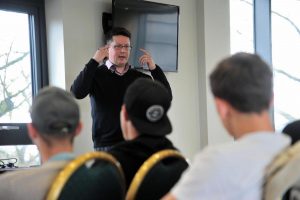News
PLAYERS BEING EDUCATED ON GAMBLING RISKS

The Galway Races. A social highlight of the year.
Once a haven for the purists, this week Ballybrit will rival Game of Thrones for the range of characters on show.
Along with all the fashion and the craic, the fascination for Ireland’s biggest racing festival is reflected in the pub chatter.
Amidst a group of young men that will besiege the bar, one dicky-bowed individual will emanate an air of profound wisdom as he discusses the form of those entered in the Galway Plate. He will later hush his audience with a learned opinion of the state of the ground and how it affects some horses.
Onlookers assume that his rural accent has afforded him status amongst his peers.
Or does it?
In truth, this dapper individual is about as intimate with the world of gambling as Kem and Amber are with the ups and downs of jockeying to prize money on Love Island.
Unbeknownst to himself, he gives a snapshot of the statistic that sees Ireland record the third highest gambling losses in the world, behind only Australia and Singapore. You’d have to think that Pascal Donohue’s gig is made ever harder when you consider that the people he represents gamble approximately €5bn every year (€10,000 every minute).

“There’s nothing wrong with a bet,” assures Paul Buck of EPIC Risk Management, a leading independent gambling harm-minimisation company, “…but it is a slippery slope if you start to lose control.”
Once a high-flying banker whose successful career was underpinned by a happy family life in Lancashire, Buck’s life was unravelling behind the scenes as he stood before 3,000 enviable peers to share ‘what success looks like’ at his company’s annual conference in December 2011.
Just six months later he was at rock bottom – penniless, unemployed, and suffering from the many other negative effects of pathological gambling.
“I was an 18-year-old with no absolutely no interest in gambling,” Buck begins. “I went to Leeds University and I joined a football team full of massive gamblers. I lasted four days before I ended up in the bookmaker’s shop.
“I put a £10 e/w bet on a complete outsider simply because it was running in blue and white – Preston North End are my team. Within seven minutes I had £500 in my pocket and I still remember the warm river feeling running through my brain. I gambled every day after that for 17 years and I’ve never had that feeling back.
“If I supported Manchester United, it might have been so very different.”
Buck was in Dublin recently as Rugby Players Ireland rolled out the latest module in its player well-being programme, that has seen EPIC visit each of the four provinces this year.
According to Buck, sports people are amongst the most susceptible factions to high risk betting given their dedicated and compulsive disposition and constant pursuit of adrenaline. Consequently, EPIC has worked extensively throughout professional sport, with a particular emphasis on rugby union, football and cricket.

“The armed forces need to replicate the trigger of being shot at for months of the year. They can’t drink or take drugs because they’re tested until they’re blue in the face, so 24/7 they are on their laptops. Those in the financial sector gamble on trades and investments. How do you intrinsically bet all day and then put it down at night?
“In sport, you often have lots of time and money, the buzz of matchday, injuries – so many triggers. Rugby players have intense 80-minute periods full of thrills and adulation. How do you replicate that on a consistent basis?”
Buck proceeds to tell us about a recent meeting set up by a football club with one of their high-earning players. The player in question disputed the need for any intervention arguing that by gambling less than a quarter of his monthly pay packet, he did not represent a gambling risk.
“If I earned £1k and lost £250, we would not be here in this room,” Buck was emphatically told. “…And sometimes I win!”
However, the problem is that when the revenue streams dry up, everything falls out at the bottom – the cars, the houses, the lifestyle. Gamblers are unable to scale back their habit if they’ve already lost control. According to XPRO, an organisation that has been established to assist all former professional footballers, 60% of players are bankrupt within five years of retirement.
Buck stresses that there are contrasting forms of gambling habits. But with the advent of online betting in addition to 1300% more TV advertising than ten years ago, the proliferation of pathological gambling is no surprise. Anonymous addictions are rife.
Now recognised as a full behavioural addiction akin to heroin misuse, Buck’s pathological gambling manifested itself through the creation of his own private world, entirely separate from his work and family because he didn’t want anybody or thing to put his betting in jeopardy.
“I distinctly remember one Christmas Eve when I was sitting in watching a film when this big hamper landed at the door. I noticed a tag which told me it was from the bookies and I ripped it off as my wife was coming down the stairs.
“I turned to her and said ‘Oh! I got you this for Christmas!’ She opened it up and there was about £12,000 worth of stuff in there – none of which she uses! Over the next three hours I had six more hampers arrive.”
Sadly, for every gambler a further ten people are affected within their community of family and friends. However, Buck believes that if it is someone in the public eye and adored by millions, that figure is bound to be far greater.
“When you start to gamble, it can take over the chemicals and re-wire your brain which will affect your performance. All you’re bothered about is how you can place your next bet and not about your career, whether that’s playing for Leinster, Ireland or the British & Irish Lions.
“We have seen talented lads at 18 let their careers spiral out of control into nothing by the time they’re 23. They’ll keep it completely anonymous and have multiple accounts as they chase free-bet offers. They usually have another addiction too, probably shopping, as they to try to alleviate their urges.”

It was upon a chance reading of an article by Dr. Henrietta Bowden-Jones in The Independent following the death of Gary Speed by suicide in 2011, that Buck began to sit up and take notice of his irregular behaviour.
In asking whether the former Leeds Utd footballer may have been a gambler, Dr. Bowden-Jones began to effectively describe Buck’s daily habits. After much soul-searching, he promptly began to replace his gambling addiction with gambling research. Through his studies he developed a vision.
“It became clear to me that in Ireland and the UK, you have to have fallen off the cliff already to get some help. We shouldn’t be waiting for people to end up suffering relationship breakdown, mental illness, bankruptcy or suicide.
“Surely it would be better if a professional and credible team of people could work pro-actively within our high-risk sectors. A team who would work on increasing awareness of the potential effects of gambling harm and help to decrease the stigma that is still attached to this condition.
“If we could do that we could protect our sport clubs, organisations and the individuals within them.”
Richard McElwee
To read EPIC Risk Management’s Annual Report click here.

Latest Posts

Player Development Programme Review

Finding Hope

Highlights: February 2025
















